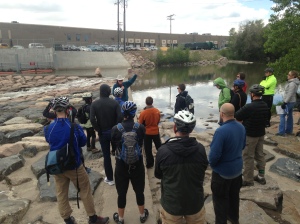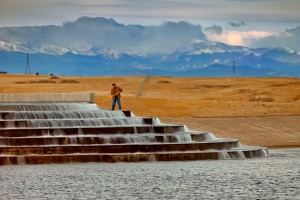CFWE’s urban waters bike tours help Coloradans understand the connections between urban rivers, water supply and the environment.
When an earthquake hits or a wildfire blazes, there’s little doubt that a natural disaster is under way. But a water crisis can creep up slowly over years. Most people won’t even notice the problem until their taps runs dry and water rates skyrocket.
That’s why it’s important to get people involved in Colorado water planning before there’s a big emergency, according to Tom Cech, director of the One World Water Center at Metropolitan State University at Denver.
Last week, Bob Berwyn published this story in the Colorado Independent, with a significant tip of the hat to water education. Read the full piece here. He goes on to write:
Water literacy is crucial to spur involvement in Colorado’s statewide water planning, according to outreach experts with the Colorado Foundation for Water Education.
To help cut through the haze of jargon and connect people to water issues, the nonprofit is sponsoring summer events including water tours and two free cycling treks along the South Platte River in early June.
The bike tours include short talks about how to make sure there’s enough water in the future for growing cities, thirsty farms and healthy rivers.
“People don’t think about water until it’s not coming out their faucet, but by then, it might be too late in terms of a water plan,” said CU Boulder’s Elizabeth Koebele, a PhD student researching Colorado River water-planning efforts.
Photo courtesy of Havey Productions. Participants of CFWE’s Water Efficiency Tour will visit various water reuse and recycling facilities along Colorado’s Front Range in June.
CFWE is also offering a two-day water efficiency tour (June 11-12), with a detailed look at what Front Range cities and utilities are doing to make sure the taps don’t run dry.
There’s not much appetite (nor extra water) for building giant dams and pipelines to take water from Western Colorado to the Front Range, so the first draft of the water plan focuses on conserving and reusing water.
Such incremental steps, along with increased cooperation among Front Range cities, can go a long way toward averting a Colorado water crisis, according to Cech.
“In the big picture, it’s not all that complicated, but there’s no substitute for seeing something with your own eyes,” said Cech, who will host the first stop of the tour by talking about conservation at the Auraria Campus.
A visit to Denver Water’s recycled-water plant will illustrate some of the challenges of using recycled water, both in terms of cost and public perception. Not everybody is keen on drinking recycled water, said Cech.
“If the pipe goes right from the recycling plant to people’s taps, there’s not a comfort level. But for some reason, if it goes back into nature first and runs down a stream for awhile, people are OK with it,” he said.
Other stops on the tour include a dinner event with a presentation by Ellen Hanak, of the Public Policy Institute of California, on what Colorado can learn from California’s current epic drought.
To get involved in the water planning process, go to the website for Colorado’s Water Plan.
For more information about the tours, go to the CFWE website.



 Print
Print